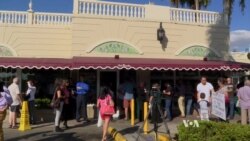For decades, older, more conservative Cuban Americans have been gathering at Café Versailles in Miami on the corner of Calle Ocho to eat Cuban food and talk politics.
After hearing of President Barack Obama’s decision to renew diplomatic relations with Cuba, a number of political and economic exiles from the communist nation gathered in front of the café with posters to protest.
Raymond Molina is one of them. The former Supreme Court judge in Havana once sat on the trials of members of the 26th of July Movement led by revolutionary Fidel Castro. But once Castro swept into Havana, Molina was forced to leave.
His feeling of betrayal over Obama’s decision is strong.
“This act,” he told VOA, “has consolidated a dynasty of the Castros for many more years to come. It has not opened an opportunity. On the contrary, the Cuban people will never have an opportunity to decide their own fate or system of government,” said Molina.
The anti-Castro political movement here is solid, and for years it has influenced U.S. administrations to maintain a strong economic, political and cultural trade embargo on Cuba.
But as the years have passed, not all Cuban Americans think the same as Molina. For the older generation, U.S. policy toward Havana is a question of politics and democracy. For second and third generation Cuban-Americans, however, it is all about economics.
Across town from Calle Ocho is Hialeah, home to younger Cubans with more modest incomes. Pablo Gonzalez, out shopping with his girlfriend in the popular store No Que Barato, told VOA it was time for a change.
“It’s been 50 years. The embargo doesn’t work. The country is basically becoming more poor every day. Sixty years. What has that brought to the country? Nothing,” he said.
Gonzalez said the older generation is out of touch with what the people of Cuba need.
The No Que Barato store is a large sprawling space with tables full of cheap clothes. At the entrance, there is an imposing statue of Jesus atop a glass box full of dollar bills -- donations of those praying for better times.
Many shopping here want to forget the political past, and they say lifting obstacles to trade and travel will help the Cuban people.
One of those is Victor Iniguez. A truck driver in his late 50s, Iniguez arrived in Miami as part of the Mariel refugee boatlift of the 1980s, when more than 10,000 people fled the economic crisis in Cuba. He said he believes Obama’s decision is the beginning of something good.
“It’s going to be like an encounter, like what happened [with] the Berlin wall, the people, you know, they clasp each other and love, you know, because they don’t see each other, they don’t feel each other for a long time,” he said.
Iniguez, like many others here, already is dreaming of the freedom of going home and seeing his family once again.
Obama said on Wednesday that Washington’s past policy of isolating Cuba had not worked, and spoke of re-establishing diplomatic relations with Havana.
But vocal political opponents of the deal, such as Florida’s Republican Senator Marco Rubio, already are promising to block the nomination in Congress of any U.S. ambassador to Cuba.






